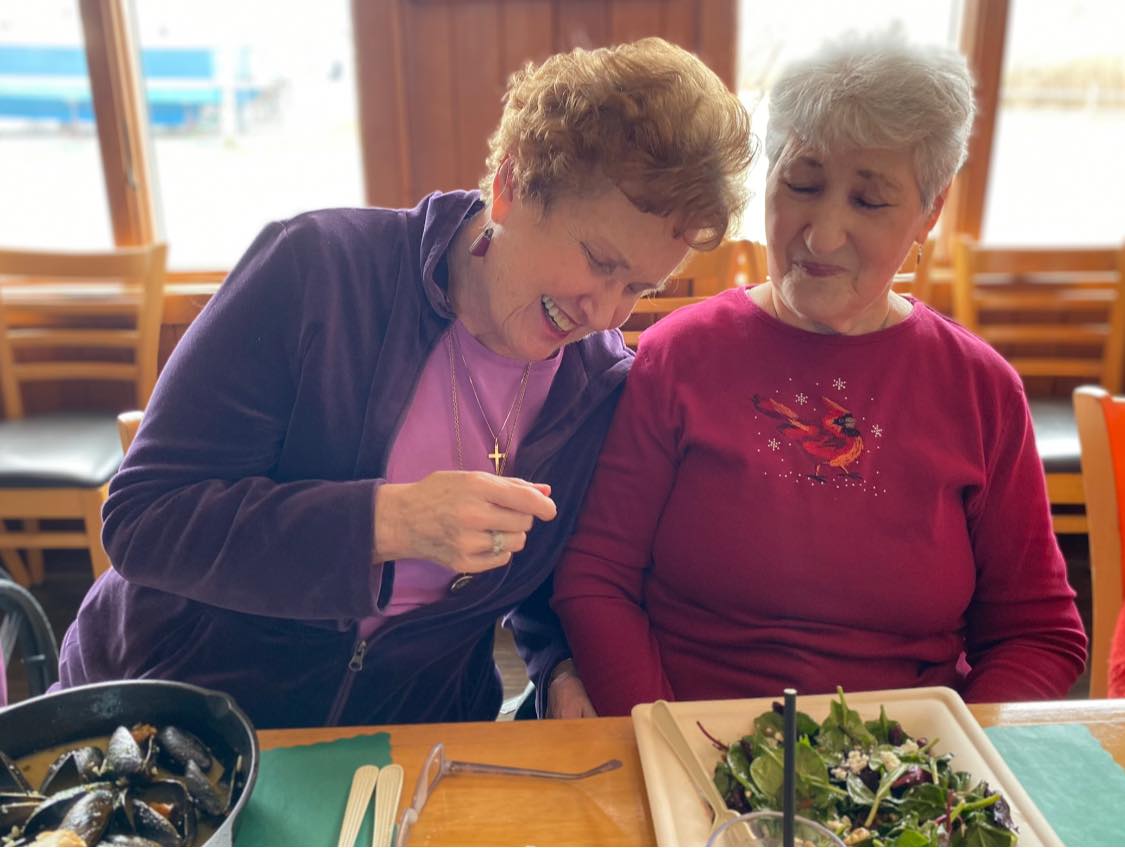What Does a Respite Worker Do (Care, Cost, Duties, and More)?
March 27, 2024 | News | Reading Time 8:00 Minutes
Caring for an elderly loved one is a noble and worthy endeavor. Yet, long-term care can take a real emotional and physical toll on your body and psyche.
Without taking breaks now and then, we can become tired, stressed, or worse yet, depressed and burnt out. And that’s the last thing anyone wants for themselves or their elderly loved ones.
The senior living staff at Village Green are here to support you. We know what it’s like to be in your shoes.
Our staff has decades of experience providing caregivers with long-term respite care for elderly loved ones.
With proper breaks, self-care, and rest-and-relaxation time, there’s no reason you can’t enjoy a healthy reprieve from caregiving while providing excellent care for elderly loved ones.
If you’re wondering what respite workers do — and how they can be of help to you — join us! In this article, we’ll discuss what respite workers do, ways to cover the cost of respite care, and more.
What is a respite worker?


The word respite means “a short period of rest or relief from something difficult or unpleasant.”
Respite workers are health caregivers who step in to help a primary caregiver. A respite worker’s main job is to provide emotional and physical caregiving to the individual the primary caregiver is supporting.
These workers provide necessary care on a short-term basis, and they allow the caregiver to take some much-needed R&R. Most respite workers will support for a few hours at a time. But, some may provide care as long as a few days, weeks, or months at a time.
The amount of time a respite worker supports a primary caregiver depends on the agreement made between the care worker and the primary caregiver.
What services does a respite worker provide?


Most respite caregivers provide in-home respite care or respite care services at an accredited assisted living or skilled nursing facility. Depending on the location or the duties, most respite care workers provide help with activities of daily living (ADLs).
For senior populations, respite workers provide help with the following ADLs:
- Hygiene tasks (such as brushing teeth, bathing, combing hair, and changing clothes)
- Medication administration
- Using the restroom
- Meal preparation and eating
- Planning and supervising social activities
- Checking vital signs
- Some light housekeeping and cleaning
- Transportation to and from appointments
- Completing errands
Many senior citizens at assisted living and memory care facilities also appreciate the companionship and support they receive from respite care workers.
Respite care workers often play games with, read to, and take seniors on social outings. In short, respite care workers provide a great deal of value to senior populations and their families.
Certifications needed to be a respite worker


Respite care providers and workers must pass a background check and have at least a high school diploma to provide respite care. Respite care workers must also hold the following certifications and licenses to provide respite care to senior populations.
- CPR and First Aid certifications
- A reliable form of transportation and a driver’s license
- If a senior needs help with healthcare-related tasks, a Certified Home Health Aide (CHHA) credential
Every senior is different. If your aging loved one has specific respite care needs, you can always reach out to a home health care agency or senior living facility for more help on finding the right certified respite care worker for your needs.
Best practices for finding quality respite care


Respite care comes in all different shapes and sizes. You can find professionals who offer respite care by doing a quick search on the internet for quality respite care providers. Also, you can visit ARCH’s National Respite Locator Service to find a quality respite care provider near you.
Whether you’re looking for adult daycare, services for veterans, or state-sponsored programs, you can also reach out to your local healthcare agency or organization. If you need to take some time away from your caregiving tasks sooner rather than later, don’t hesitate to reach out to friends and family.
Close friends and family can give you a much-needed, short-term break if you’re in a pinch.
A couple of notes on the cost of respite care


Respite care coverage is nuanced. For example, a person receiving hospice care can have the cost of respite care covered for up to five consecutive days in a hospital or skilled nursing facility.
Medicaid may also cover some of the cost. But, if you have a private health insurance plan, most plans don’t cover the cost of respite care. With that said, some long-term care insurance plans may offer coverage for respite services.
Otherwise, families and loved ones must cover any costs not covered by insurance or government programs.
Table: A breakdown of the work of respite care workers
| Services provided | Certifications needed | |
| Respite care workers | 1. Hygiene tasks 2. Medication administration 3. Incontinence support 4. Meal preparation 5. Social activities 6. Light housekeeping 7. Transportation 8. Running errands 9. Other healthcare services (as needed) | 1. A high school diploma 2. CPR and First Aid 3. Driver’s license and reliable form of transportation 4. Certified Home Health Aide (CHHA) credential (for special populations) |
Take a load off with long-term respite care


We know caregiving isn’t easy. Without the right resources and recharge time, excessive caregiving can lead to caregiver burnout.
Fortunately, there’s a solution: respite care. Respite care workers provide temporary, short-term emotional and physical caregiving and support with activities of daily living (ADLs) to elderly individuals.
It’s a win-win for everyone. Seniors receive the care they need, and caregivers can take time away from their duties for personal care.
At Village Green, our caregivers provide long-term respite care to give caregivers the much-needed break and peace of mind they deserve. Located in the heart of the hamlet of Levittown, New York, our assisted living and memory care facilities are close to most conveniences, amenities, and services.
If you need a break, let us take a load off your shoulders. To learn more about our senior living solutions — or to talk about long- and short-term respite care solutions for you or a loved one — don’t hesitate to reach out to our friendly senior living concierge staff members. They’d be more than happy to help!
Frequently Asked Questions (FAQ) About Respite Workers


Which types of people do respite workers help?
Respite care is for children or adults. These services are designed to give caregivers short-term relief from caregiving duties.
Respite care work can be provided at home, a care facility, or adult daycare center. This special type of care is provided to individuals who need help taking care of their physical and emotional needs.
What services do respite workers provide?
Respite care helps support an individual’s emotional and physical needs. To meet those needs, respite workers provide the following:
- Help with activities of daily living (ADLs) such as eating, bathing, grooming, light housekeeping, medication management, socializing, and transportation to and from appointments
- Companionship, engagement, and emotional support
- Healthcare-related tasks unique to the individual’s care plan
What’s the best way to cover the cost of respite care?
Most people cover the cost of respite care through the following means:
- Medicaid
- Long-term care insurance programs
- Government assistance programs
- Adult daycare services
- Various community organizations
- Veterans pensions
- And more
Most private health insurance plans don’t cover the costs of respite care. But, Medicare will cover most of the cost. To have costs covered, a respite care recipient must have used no more than five consecutive days of respite care and received their care in a hospital or skilled nursing facility.
“Her health and hygiene are well taken care of.”


“Village Green is a nice place for mom. The staff is friendly and caring.
The place is bright and cheerful, and the directors are concerned about her needs. Her health and hygiene are well taken care of, and she seems to be doing well.
There are plenty of activities for the residents, and everyone seems to be well cared for. Thanks for taking such good care of our loved one.” – Village Green family member




